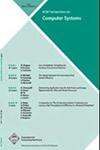Charlotte: Reformulating Blockchains into a Web of Composable Attested Data Structures for Cross-Domain Applications
IF 1.8
4区 计算机科学
Q2 COMPUTER SCIENCE, THEORY & METHODS
引用次数: 0
Abstract
Cross-domain applications are rapidly adopting blockchain techniques for immutability, availability, integrity, and interoperability. However, for most applications, global consensus is unnecessary and may not even provide sufficient guarantees. We propose a new distributed data structure: Attested Data Structures (ADS), which generalize not only blockchains, but also many other structures used by distributed applications. As in blockchains, data in ADSs is immutable and self-authenticating. ADSs go further by supporting application-defined proofs (attestations). Attestations enable applications to plug in their own mechanisms to ensure availability and integrity. We present Charlotte, a framework for composable ADSs. Charlotte deconstructs conventional blockchains into more primitive mechanisms. Charlotte can be used to construct blockchains, but does not impose the usual global-ordering overhead. Charlotte offers a flexible foundation for interacting applications that define their own policies for availability and integrity. Unlike traditional distributed systems, Charlotte supports heterogeneous trust: different observers have their own beliefs about who might fail, and how. Nevertheless, each observer has a consistent, available view of data. Charlotte’s data structures are interoperable and composable: applications and data structures can operate fully independently, or can share data when desired. Charlotte defines a language-independent format for data blocks and a network API for servers. To demonstrate Charlotte’s flexibility, we implement several integrity mechanisms, including consensus and proof of work. We explore the power of disentangling availability and integrity mechanisms in prototype applications. The results suggest that Charlotte can be used to build flexible, fast, composable applications with strong guarantees.Charlotte:将区块链重新定义为跨领域应用的可组合认证数据结构网络
跨域应用程序正在迅速采用区块链技术,以实现不变性、可用性、完整性和互操作性。然而,对于大多数应用程序来说,全球共识是不必要的,甚至可能无法提供足够的保证。我们提出了一种新的分布式数据结构:认证数据结构(ADS),它不仅推广了区块链,还推广了分布式应用程序使用的许多其他结构。与区块链一样,ADS中的数据是不可变的,并且是自认证的。ADS进一步支持应用程序定义的证明(证明)。验证使应用程序能够插入自己的机制,以确保可用性和完整性。我们介绍了Charlotte,一个可组合ADS的框架。Charlotte将传统的区块链解构为更原始的机制。Charlotte可以用于构建区块链,但不会强加通常的全局订购开销。Charlotte为交互应用程序提供了一个灵活的基础,这些应用程序定义了自己的可用性和完整性策略。与传统的分布式系统不同,Charlotte支持异构信任:不同的观察者对谁可能失败以及如何失败有自己的看法。尽管如此,每个观察者对数据的看法都是一致的。Charlotte的数据结构是可互操作和组合的:应用程序和数据结构可以完全独立地运行,也可以在需要时共享数据。Charlotte为数据块定义了依赖于语言的格式,并为服务器定义了网络API。为了展示Charlotte的灵活性,我们实施了几个诚信机制,包括共识和工作证明。我们探索了在原型应用程序中解开可用性和完整性机制的力量。结果表明,Charlotte可以用于构建具有强大保证的灵活、快速、可组合的应用程序。
本文章由计算机程序翻译,如有差异,请以英文原文为准。
求助全文
约1分钟内获得全文
求助全文
来源期刊

ACM Transactions on Computer Systems
工程技术-计算机:理论方法
CiteScore
4.00
自引率
0.00%
发文量
7
审稿时长
1 months
期刊介绍:
ACM Transactions on Computer Systems (TOCS) presents research and development results on the design, implementation, analysis, evaluation, and use of computer systems and systems software. The term "computer systems" is interpreted broadly and includes operating systems, systems architecture and hardware, distributed systems, optimizing compilers, and the interaction between systems and computer networks. Articles appearing in TOCS will tend either to present new techniques and concepts, or to report on experiences and experiments with actual systems. Insights useful to system designers, builders, and users will be emphasized.
TOCS publishes research and technical papers, both short and long. It includes technical correspondence to permit commentary on technical topics and on previously published papers.
 求助内容:
求助内容: 应助结果提醒方式:
应助结果提醒方式:


